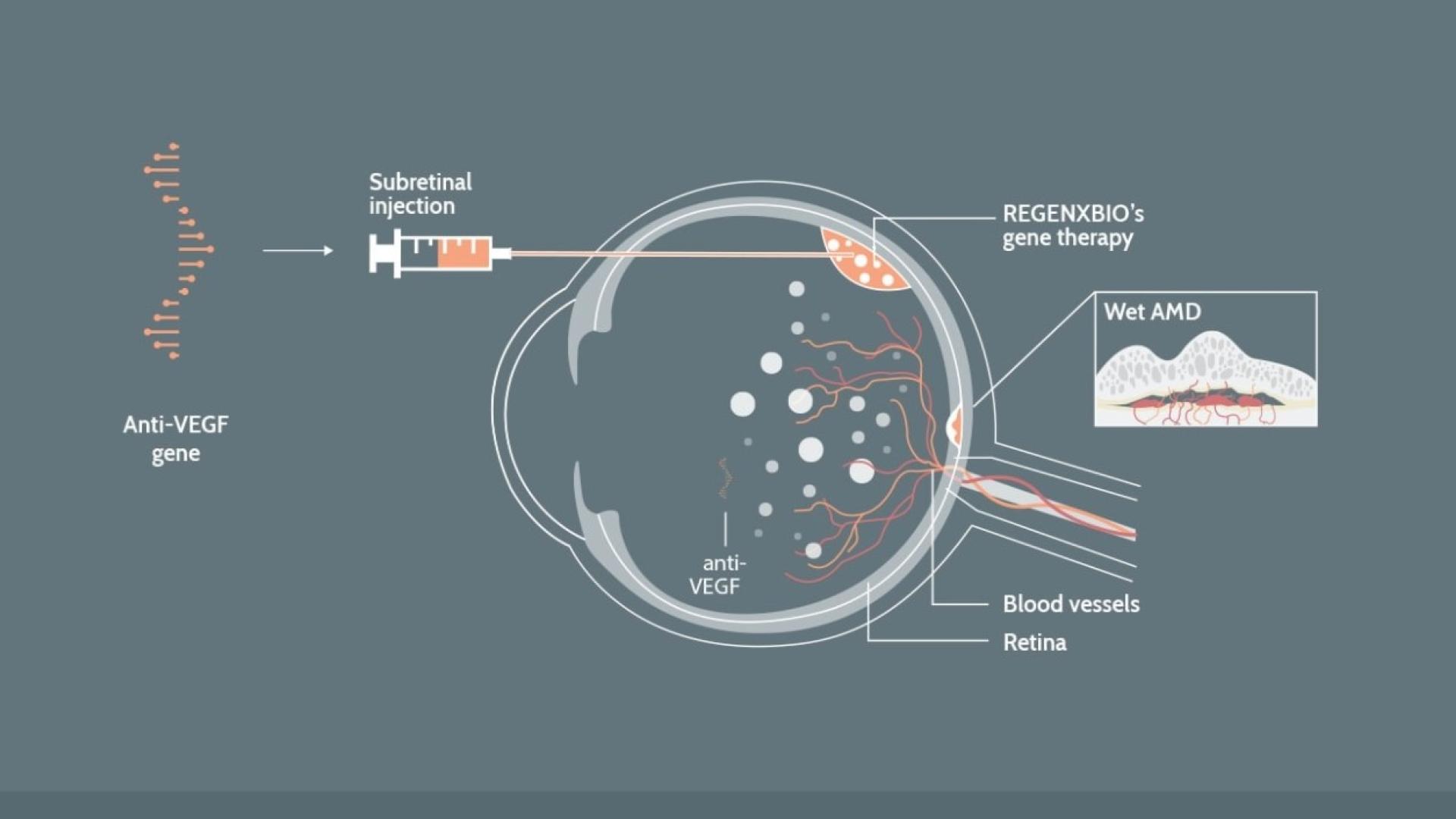One-Time Gene Therapy with Lasting Effects Being Tested for Wet AMD
Written By: BrightFocus Editorial Staff



Written By: BrightFocus Editorial Staff

Speaking recently on a BrightFocus Chat discussion, a leading ophthalmologist provided an overview of an exciting new treatment for age-related macular degeneration (AMD) that is currently in the clinical trial stage of drug development.
Arshad Khanani, MD, an ophthalmologist specializing in retinal disease and director of clinical research at a large Nevada eye clinic, described RGX-314, a proposed gene therapy being developed by REGENXBIO Inc., a biotechnology firm based in Rockville, MD. Developed to treat wet macular degeneration and diabetic retinopathy, RGX-314 is being heralded as a “game-changer” in that it is designed as a potential one-time treatment whose effectiveness, at least in some patients tested so far, can last up to three years. The therapy uses a viral vector to deliver a gene to the back of the eye, a gene that encodes for a monoclonal antibody fragment that binds to and neutralizes VEGF activity. The goal is to continuously produce anti-VEGF compounds in the eye – a stark contrast from the monthly injections many patients with AMD must receive to maintain their vision.
RGX-314 is designed to be used in patients who respond to conventional therapy, ie anti-VEGF compounds and injections that are now the standard of care. It produces a protein very similar to the drugs currently approved for injection in the eye to treat wet macular degeneration. In trials so far, roughly two-thirds of patients required no further injections after just one treatment. “The goal is to make your eye a biofactory to secrete the protein,” Dr. Khanani told listeners.
There is a subset of patients who may need “booster” injections if their disease is more advanced. But even in those instances, patients could go from monthly injections to an injection every few months. “I think that still is a game-changer in terms of controlling the disease,” Dr. Khanani said.
However, there is still more research to be done before all this can happen. “REGENXBIO’s programs are very advanced, but again, they’re still in clinical trials, and they’re not approved for the general population yet,” he said. “We are hoping, within the next 3–5 years, that we may have an FDA-approved medication if the trials show the efficacy and safety that we are looking for.”
Giving background on the clinical trials process, Khanani emphasized that the U.S. Food and Drug Administration (FDA) oversees the process to ensure patient safety. The agency reviews all protocols and products before the beginning of a trial involving human volunteers to test the tolerability, safety, and effectiveness of a potential new treatment. Currently, several RGX-314 mid-to late-stage (Phase 2 and 3) trials are recruiting or underway to test its safety, tolerability, and effectiveness in different contexts, ie, when used for AMD or diabetic retinopathy, and when injected into the subretinal intravitreal space (as anti-VEGF injections are now given) or into the suprachoroidal space of the eye.
Volunteers are being recruited for some of the RGX-314 trials taking place at various eye centers across the country, including Dr. Khanani’s own clinic located in Reno, NV. Giving advice to those considering joining a clinical trial, he said: “I think the best way [to get involved] is to speak to your doctor. Figure out if you’re a right fit, ask them to see [who in the area] is doing it. And remember, there’s a lot of inclusion and exclusion criteria for each trial, so not every patient qualifies for every trial, but the only way to find that out is to speak to your doctor.”
Concluding with big picture advice for vision health, Khanani said, “a general guidance is to eat healthy green, leafy vegetables; wear sunglasses; and exercise if you can,” and he stressed the importance of seeing an eye doctor once each year. “The earlier you treat a disease when it comes to the retina, the better outcome you’re going to have […] make sure that you follow the treatment plan and stay on course with treatment as recommended by your doctor.”
BrightFocus Chats are free, monthly discussions with leaders in vision research and care. Past programs are available for listening or reading in transcript and can be accessed here. You can also sign up here to be notified of upcoming chats and register to attend (scroll down to sign-up form at end).
Patients and their doctors also can access more information on RGX-314 clinical trials by visiting the REGENXBIO website at www.regenxbio.com/rgx-314 or calling the company at (240) 552-8181. Information about all registered trials can also be searched at the FDA website, clinicialtrials.gov. (Click here for a list of RGX-314 trials that are beginning and/or currently recruiting. Once you click on an entry, trial locations are listed at the far right.).
BrightFocus Foundation is a premier global nonprofit funder of research to defeat Alzheimer’s, macular degeneration, and glaucoma. Through its flagship research programs — Alzheimer’s Disease Research, Macular Degeneration Research, and National Glaucoma Research— the Foundation has awarded nearly $300 million in groundbreaking research funding over the past 51 years and shares the latest research findings, expert information, and resources to empower the millions impacted by these devastating diseases. Learn more at brightfocus.org.
Disclaimer: The information provided here is a public service of BrightFocus Foundation and is not intended to constitute medical advice. Please consult your physician for personalized medical, dietary, and/or exercise advice. Any medications or supplements should only be taken under medical supervision. BrightFocus Foundation does not endorse any medical products or therapies.
